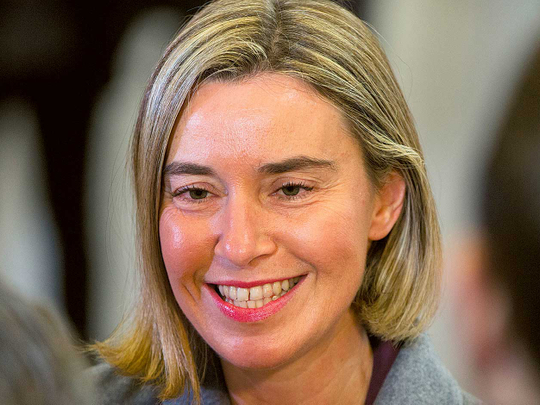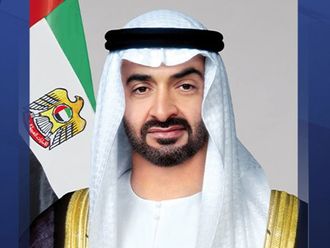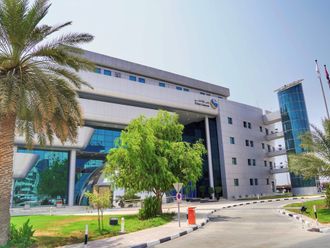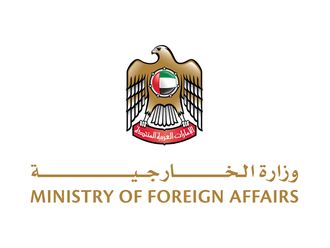
Abu Dhabi: The European Union is ready to sponsor any initiatives to de-escalate tensions in the Gulf region and resume GCC-Iran dialogue, said Federica Mogherini, European Union Foreign Policy Chief, on Saturday.
“We have been calling on Iran as well as on all the other countries to take tangible actions and constructive steps to improve the situation. What we support, as the European Union, is a more cooperative regional framework and we are ready to sponsor initiatives, which could lead to de-escalation of tensions and resumption of dialogue,” Mogherini told Gulf News ahead of her participation in the Sir Bani Yas Forum held in Abu Dhabi under the Chatham House Rule of non-attribution and no reporting media.
Mogherini stressed that all nations have to avoid actions, which feed sectarianism and polarisation. “The Gulf region can only prosper if stability and good neighbourly relations prevail, but this requires some serious confidence building,” Mogherini said.
Dr Anwar Mohammad Gargash, Minister of State for Foreign Affairs, recently told the Abu Dhabi Strategic Debate the UAE requires that a dialogue with Iran “be genuine and constructive, based on a clear set of principles”.
“Iran has to respect the sovereignty and territorial integrity of Arab states, end its claim to authority over Shiite communities in other countries, and cease all efforts to export its revolution. In other words, Iran must act as a state rather than an exporter of revolution and instability,” Dr Gargash said.
Iran occupied Abu Mousa near the mouth of the strategic Strait of Hormuz, along with Greater and Lesser Tunbs on the eve of the UAE’s independence in December 1971 and the issue has been a point of contention between the two countries ever since.
UAE leaders, including Shaikh Zayed Bin Sultan Al Nahyan, the nation’s founding father, have repeatedly urged successive Iranian governments to end the dispute through direct negotiations or international arbitration. These calls, however, have been consistently turned down by Iranian officials.
Mogherini said: “We managed to achieve the signature of the Joint Comprehensive Plan of Action [known commonly as the Iran nuclear deal]. It’s not a bilateral but it’s an international deal, enshrined in a United Nations Security Council resolution. Implementation is on track and all sides have been delivering on their commitments. “We have to make sure that this continues to be the case and as the Coordinator of the Joint Commission I am responsible for overseeing the implementation, a task I take very seriously.”
UAE’s role
Earlier, Mogherini said the UAE is a country we work hand in hand with on bilateral issues in an excellent manner. “It’s the only Arab country that has a visa waiver regime with the European Union, a country with whom we have so much in common on so many different files, from energy and climate change to trade, culture relations. Looking forward to seeing the Expo 2020 here in the country. We also have a common regional agenda. This is why we indicate in our global strategy that we need to work together with the Gulf countries. There are many challenges and opportunities we can both work on together,” Mogherini said, and added that the UAE is a source of inspiration for having the first woman Speaker of the Federal National Council.
Ceasefire in Yemen
Mogherini said we need urgent progress with a rapid conclusion of an extended cessation of hostilities in Yemen to restart the UN peace talks and guarantee access for critical humanitarian assistance. “More than 80 per cent of the Yemenis depend on some form of assistance and more than half of the population is left food insecure. It is essential to reverse this path,” Mogherini said.
The whole region is suffering from the impact of prolonged crises, which are spreading instability. But we have seen the power of diplomacy and how through diplomacy we can achieve what is perceived as impossible. However, serious challenges remain across the region.
Syria crisis
On Syria, Mogherini said: “We are witnessing a humanitarian tragedy. We have to act, and act fast. The EU is committed and mobilised in that direction. Facts not only demonstrate that there can be no military solution to the conflict but that regional actors have a big role to play there. I’m in the Emirates also as part of the reaching out to key regional actors I’ve started some weeks ago, in full coordination with the United Nations, to start reflecting on the future political and institutional set up of Syria, and on the reconstruction. This could help also to create some space and confidence for the intra Syrian talks to restart.”
Mogherini added the European Union is also pushing hard for urgent humanitarian access, asking for medical evacuations and aid deliveries to be allowed in eastern Aleppo and in all besieged areas, and mobilising further aid packages. “We cannot watch children die and hospitals be bombed without acting.”
Libya
Mogherini said we need to ensure the success of the Libyan Political Agreement. “All Libyans must come together in a spirit of compromise. And again, in Libya as for Syria, we are actively mobilised, supporting the Presidency Council in delivering basic services and security to the Libyan citizens, and with the naval Operation Sophia, relentlessly helping in countering smuggling across the Mediterranean and saving lives at sea every day,” Mogherini said.
Lebanon
Mogherini said there are also signs of hope in the region. “After 30 months of political deadlock, a president was elected in Lebanon, a key partner of the EU.
Fight against terror
Mogherini said the ongoing military operation to liberate Mosul is crucial in the fight against Daesh. “The protection of civilians is definitely a strong priority for the EU and the even bigger challenge will be the stabilisation and reconciliation in areas in the region liberated from Daesh, to give back hope to the citizens and motivate them to build together a brighter future for their country. And we are committed to be there when this moment comes. My message to all the countries of the region which can be very influential is to work together, and with us to bring stability in the region, in everybody’s interest.”
Israeli-Palestinian conflict
Mogherini said she has not heard any viable alternative to the idea of two states. “That’s why we do everything we can to keep this vision alive, and we are now concerned that continuing the current course will make this prospect increasingly remote.”
Mogherini explained: “It is not an easy task. But despite all the scepticism, there are things that each side can do to rebuild trust and make progress. Together with our partners in the Quartet, we have recommended concrete steps to both sides to reverse negative trends, restore hope and advance a two-state reality on the ground. Our goal here is to help find a new corridor back to successful final status negotiations.”
Mogherini added regional partners can play a major role in promoting and supporting a solution. “The Arab Peace Initiative with its vision of a comprehensive Arab-Israeli peace remains a key basis and we will continue to work closely together with countries in the region in order to explore ways to join our efforts. International cooperation, and synergies between various efforts is essential to advance the peace process towards a common goal.”
On the election of US President-elect Donald Trump who is seemingly planning fundamental changes in foreign policy towards Europe and the Middle East, Mogherini said it is too early to say what will be the next president’s foreign policy, especially as we are yet to meet with the President-elect’s team and to hear for ourselves what in reality his policies will be, away from the rhetoric of the election campaign.
“I am looking forward to going to Washington shortly, to meet with the next Secretary of State when they are appointed and the President-elect’s transition team, to discuss our transatlantic partnership and to continue to strengthen our relationship as has been the case under the current Obama administration. As European Union, we are open to bringing forward our relations, on the basis of our principles, values and interests. The EU’s policies in the Middle East, in any case, are clear. We will keep working towards our established goals, I hope, along with our American friends,” Mogherini said.
EU-GCC cooperation on economic diversification
Mogherini said economic cooperation is the cornerstone of the EU-GCC relations. “We have a regular dialogue on economic matters. We have recently also launched an EU-GCC dialogue on trade and investment, two crucial sectors in our relations.,” Mogherini said.
The EU Foreign Policy chief said we also have a well-established dialogue on macroeconomic issues and a dialogue on economic diversification, as “our concrete contribution to the transformation that the GCC countries are undergoing to face the new reality of lower oil prices, demographic challenges and the urgent need to move to more sustainable practices including in the energy sector. We want to bring together actors from a variety of sectors and discuss of private sector development, investment, talent management and innovation and research. This dialogue will have positive impact on our economic relations, business cooperation, and it will also benefit climate change policies in the region”.
Mogherini added the GCC countries are a major import market for the EU and “our fourth most important export market. They are also an important destination and source partner for European investment flows. We have therefore a strong interest that diversification takes place in a way that encourages additional two-way trade and investment flows.
“We also have strong energy cooperation, with a special focus on clean use of energy. Aviation is another area of strategic importance for both Europe and the Gulf region. The EU is one of the largest air transport markets in the world and a very important market for the airlines from the Gulf. We launched the EU-GCC Aviation Dialogue in 2013 creating a unique forum for discussion and cooperation. We are proposing to negotiate EU air transport agreements with all GCC countries, so to create a solid basis and legal framework for further developing aviation relations. Talks already started with Qatar and we look forward to launching negotiations with the UAE too.”
Rail is another sector in which the EU and the GCC have much to talk about. The Gulf countries are cooperating on setting up an ambitious cross-Gulf railway project and “we have been working with the GCC Secretariat to share our long experience in this sector”, Mogherini said.












